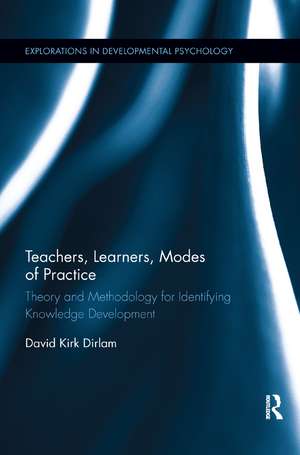Teachers, Learners, Modes of Practice: Theory and Methodology for Identifying Knowledge Development: Explorations in Developmental Psychology
Autor David Dirlamen Limba Engleză Paperback – 4 iun 2019
| Toate formatele și edițiile | Preț | Express |
|---|---|---|
| Paperback (1) | 357.54 lei 6-8 săpt. | |
| Taylor & Francis – 4 iun 2019 | 357.54 lei 6-8 săpt. | |
| Hardback (1) | 1218.08 lei 6-8 săpt. | |
| Taylor & Francis – 24 feb 2017 | 1218.08 lei 6-8 săpt. |
Preț: 357.54 lei
Nou
Puncte Express: 536
Preț estimativ în valută:
68.42€ • 71.17$ • 56.49£
68.42€ • 71.17$ • 56.49£
Carte tipărită la comandă
Livrare economică 15-29 aprilie
Preluare comenzi: 021 569.72.76
Specificații
ISBN-13: 9780367195151
ISBN-10: 0367195151
Pagini: 344
Ilustrații: 6
Dimensiuni: 152 x 229 mm
Greutate: 0.64 kg
Ediția:1
Editura: Taylor & Francis
Colecția Routledge
Seria Explorations in Developmental Psychology
Locul publicării:Oxford, United Kingdom
ISBN-10: 0367195151
Pagini: 344
Ilustrații: 6
Dimensiuni: 152 x 229 mm
Greutate: 0.64 kg
Ediția:1
Editura: Taylor & Francis
Colecția Routledge
Seria Explorations in Developmental Psychology
Locul publicării:Oxford, United Kingdom
Public țintă
PostgraduateCuprins
Part I. Beginning the Identification of Modes of Practice 1. Defining the Unit of Human Practices Part II. Exploring Modes of Practice 2. The Developmental Survey 3. The Developmental Interview Part III. Sustaining Research, Design, and Interpretation of Modes of Practice 4. Organizing Multiple Interviews into Learning Outcomes Networks 5. Embedded Networks of Fields of Expertise 6. Creating a Coherent and Accelerated Development Curriculum for the Liberal Arts 7. Transformative Learning Sequences Part IV. Inspiring the Development of Expert Practice 8. Personal and Collaborative Assessment 9. Creating and Analyzing Impacts of Instructional Designs 10. Developing Cultures of Practice 11. Praxomics with Ecological Questions for Research on Modes of Practices 12. Discovery, Innovation and Precedent of Modes of Practice
Notă biografică
David Kirk Dirlam is an Educational Assessment Consultant.
Recenzii
"Dr. David Dirlam has provided the field of education with a technique for truly understanding the intricate and essential pieces of the learning process. This has been done in a way that is complex, as learning is not a simple process. But the complexity which is presented is an indispensable approach to the development of meaningful and transformative education and the assessment of that learning."
- Catherine M. Wehlburg, Associate Provost for Institutional Effectiveness at Texas Christian University, USA.
- Catherine M. Wehlburg, Associate Provost for Institutional Effectiveness at Texas Christian University, USA.
Descriere
Summarizing a half century of work on the problem of identifying units of analysis for complex human behaviour, this book introduces modes of practice as a unit of analysis for the science and design of human activities, and shows how to record them and create field guides at scales from individual to society. Revealing scientific analysis of human practices has been hampered by the lack of a unit of analysis, Dirlam describes how the difficulties of defining a unit are overcome by combining insights from mathematics and human development.








